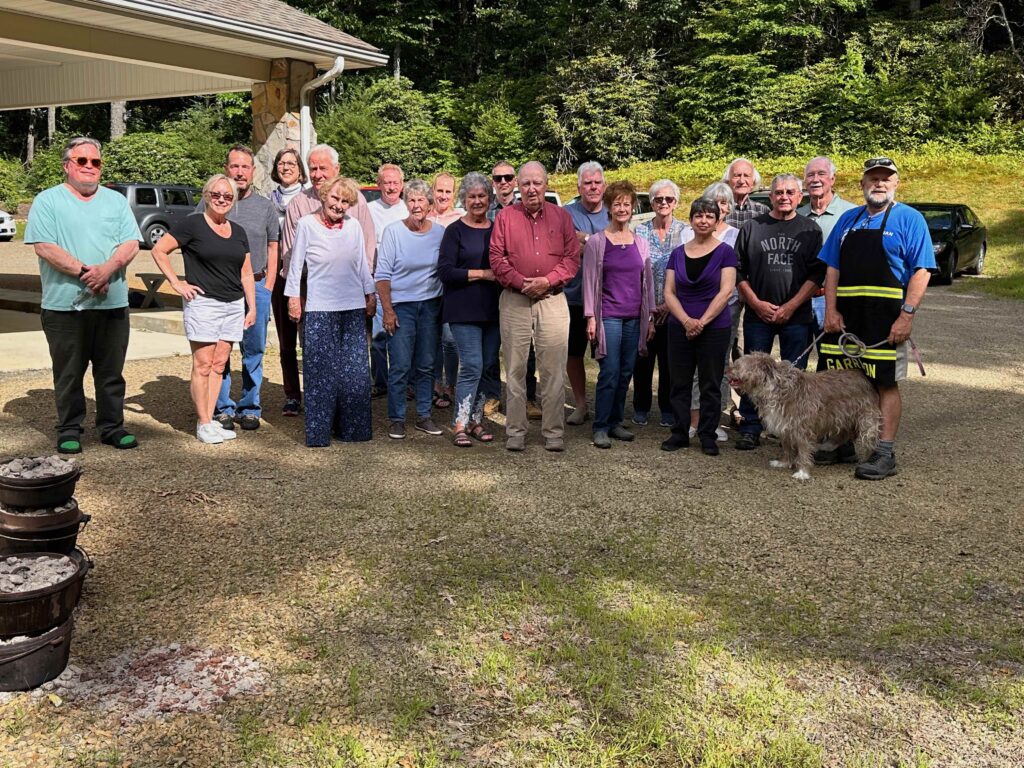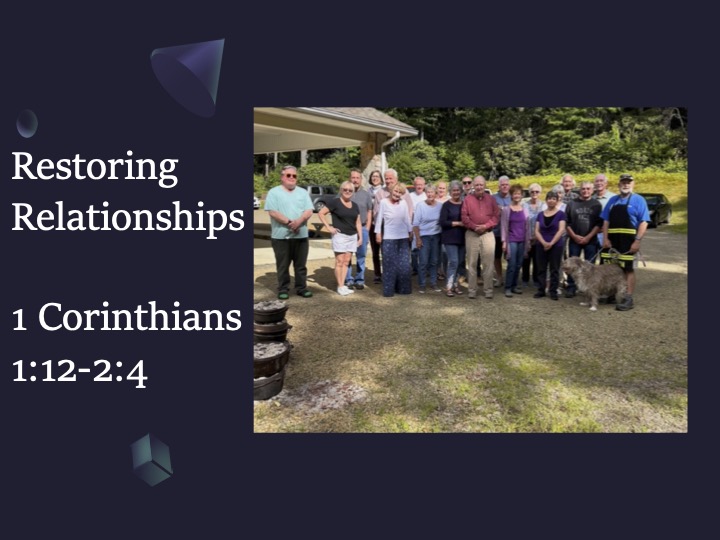Jeff Garrison
Bluemont and Mayberry Churches
June 25, 2023
2 Corinthians 1:12-2:4
At the opening of worship:
Have you ever been hurt by a misunderstanding? Either someone took what you said or did the wrong way? Or they misunderstood your intentions? It happens to us all. We chalk up such experiences to the human condition.
Our egos are fragile. It often doesn’t take much for us to be hurt, yet walking around on eggshells isn’t the answer. We shouldn’t only depend on God’s grace. We need to show grace to one another, just as we need grace from others. Also, we need to be honest about our feelings and willing to forgive and move forward. Today, we’ll see that even the great heroes of Scripture had thin skin and were hurt by what others said. What we experience isn’t a new phenomenon.
Before the reading of scripture:
Before I read today’s Scripture, let me say a bit more about 2ndCorinthians. This is the most personal letter among Paul’s epistles. We see the real Paul, and a glimpse into his emotional life. Paul wasn’t always self-confident, optimistic, and loved. He had his defectors. There were those who questioned his decisions and his teachings. This bothered Paul. After all, as a human being, he could be hurt by the actions of others. We’re going to see one response to such an experience in today’s reading.
Last week, we saw how Paul, in Asia, was threatened and concerned for his life. As Paul moves into the meat of this letter, we realize that emotional hurts can be just as damaging as physical threats. In fact, they may be even more damaging, especially when they come from those you love and respect. Most of us, by experience, know the fallacy within the childhood rhyme, “Sticks and stones may break my bones, but words will never harm me.” Words do hurt, as Paul expresses here.
Paul whines
Let me make one apology and then give you some background to our text. I apology for the passage. Paul appears to whine, although I think he tried to avoid coming off that way. The passage is also confusing for we don’t exactly know all the details. We’re only hearing Paul’s side of the conversation. Furthermore, there’s even one play on words within the text which unfortunately doesn’t translate well.
Paul changes his plans
As background, it appears Paul’s original plans was to travel from Asia to Macedonia, in northern Greece, then travel south, overland to Corinth. From there, he hoped the Corinthians would give him a big send-off for a trip back to Judea. But for some reason, Paul travelled directly from Asia (probably Ephesus) to Corinth, first. He did this because he thought he could then visit the Corinthians. Then he’d travel north to Macedonia. On his way south, he’d stop again and see his friends, before heading across the Mediterranean.
Maybe Paul befriended a captain on a ship sailing from Ephesus to Corinth, who offered him a berth. This opportunity could have led to this change of plans. We can’t say for sure. It appears Paul’s visit did not go well and therefore he decided not to visit Corinth after Macedonia, but to head straight to Judea. Paul had been hurt in the visit, and it appears some in Corinth were hurt by his not visiting a second time.
Have you ever had an unexpected guest arrive at an inopportune time? Maybe you stopped by to see a friend during a middle of a family reunion? Or a party that you weren’t invited? Or maybe, when younger, you stopped to see a girl or a boy to whom you were interested, as they headed out on a date with someone else? That would be embarrassing, right?
Paul’s problems
It appears something like this happened to Paul. He arrives, unannounced, in Corinth. We know Paul had concerns about the teachings going on in Corinth.[1] Maybe another missionary was there. Perhaps this missionary didn’t teach the same way or the same things that Paul taught. This might have been the reason the Corinthians gave him a cold shoulder. So, he leaves Corinth feeling bad. He doesn’t return at the time when they expected him. Paul feels slighted, now the Corinthians feel slighted. Both parties have been unintendedly hurt.
Paul loves the Corinthians, so he writes this letter while also making plans for a third visit to the Corinthian church. Paul spent 18 months bringing this church to life.[2] He doesn’t want it to flounder or go in the wrong direction. So, he tries to correct the misunderstanding that has occurred.
Boosting
The opening paragraph is book-ended with the word referring to boosting. It’s a word he mostly uses in 2nd Corinthians.[3] Paul boosts about God’s grace, not his own efforts. And he looks forward to boasting about the Corinthians on the Day of the Lord, and of hearing them boast of him. Notice, the boasting isn’t of oneself, but of God and of one’s relationship with others. We can learn from this.
Paul’s hurt
But at the time of writing this letter, I don’t think Paul was doing much boasting. He was so hurt by his second visit to Corinth. The cut was so deep that he decided to avoid visiting them again on his way back for Macedonia. He didn’t want them to see him in such a manner, nor did he want them to be embarrassed. He certainly didn’t mean to hurt them. But Paul’s letter is confusing.
It seems to me this section of the letter is a lot like those I received, or maybe even sent, when I was a Junior High Romeo. You want to make things right but, in a way, you dig yourself a deeper hole. When we discussed this passage at the men’s Bible study on Tuesday, most everyone thought Paul was whining and even wondered why this section found its way into the Bible.
Why is this part of the letter in the Bible?
I don’t know why this part of the letter found its way into Scripture. I’m not privy to all the work of the Holy Spirit. However, there are useful and informative parts of 2nd Corinthians, so we can just toss the book out. And we must acknowledge God’s Spirit’s work to select the letters chosen for the Bible. So, we accept them and try to figure out what this passage can say to our lives or inform what we believe.
We see Paul’s humanity
One of the things this passage shows us is Paul’s humanity. He is no superhero. He’s a regular guy with emotions just like all of us. In a way, I think this passage may especially speak to pastors. Anyone who has spent time in the ministry knows you can’t please everyone. At times, when you do something thinking your actions are helpful to others (such as Paul canceling his return trip to Corinth), you find out your actions are perceived in a negative way.
Of course, this isn’t just experiences for those in ministry. We all experience such misunderstandings, whether it is between spouses, parents and children, friends, and relatives. Sometimes we mess up and, like Paul, try to make things right. Paul, here, works to mend the relationship by sending this letter while making plans to again visit Corinth. At such times when we’re in strained relationships, we stand in the need of grace. While we are eternally grateful for God’s grace, we should also be thankful when others show grace to us.
Paul’s love for the Corinthians
This passage ends with a beautiful statement from Paul. Despite the strain on their relationship, Paul loves and cares deeply for the Corinthians. He strives to show his concern. He’s willing to fight to restore the relationship that existed between him and the believers in Corinth.
Relationships are important
Perhaps this is what we should take from this passage. As disciples of Jesus, it’s not just about us getting our relationship right with God. We’re also to make right our relationship with others. Jesus even tells us that if we come to make an offering to God, and have wronged a brother or sister, we should attempt to reconcile before making the offering.[4] Relationships are important, as Paul shows.
Who do you need to reach out and attempt to rebuild a relationship? Think about it. And then consider how you might reach out. Paul, in this letter, doesn’t so much show us how to restore relationships, but that as a follower of Jesus, it’s important to try. Amen.
Sources:
Barnett, Paul. The Second Epistle to the Corinthians
Grand Rapids, MI: Eerdmans, 1997.
Barrett, C. K. A Commentary on the Second Epistle to the
Corinthians. Peabody, MS: Hendrickson, 1973.
Best, Ernest, Second Corinthians: Interpretation, A
Biblical Commentary for Teaching and Preaching. Louisville, KY, John Knox Press, 1987.
Wright, N. T. Paul, A Biography. San Francisco: HarperOne, 2017.
[1] In 1 Corinthians, Paul several several corrections to the Corinthians including unlawful sexual relationships (a son and stepmother), lawsuits among believers, relations with food and other Jewish practices, and abuses at the Lord’s Table. Concern about teachings within churches are also seen in Paul’s letters and the other epistles.
[2] See Acts 18:11.
[3] Paul uses this word or a variation of it more times in 2nd Corinthians than in all of his other letters combined.
[4] Matthew 5:23.



A fine message, Jeff. I don’t always read these, but glad I read this one. I had a difficult relationship with my brother at times, for a host of reasons. I regret not resolving some things before he died. But that’s where I have to trust in grace and reap the benefits of a lesson learned. Thanks.
Sorry to hear about your difficulties. I have had a few folks whom I was estranged from who then died (not relatives, but still it haunted me).
Looks like a good turnout for the Dutch Oven Dinner at Mayberry, Jeff. I am sure it has a lot to do with those wise words you share here as well as your sermon.
We had a good group there–35 or so folks. It was a lot of fun.
Someday I’m going to get around to reading N.T. Wright’s biography of Paul. It’s sitting in my TBR.
I’ve only read parts, but plan to sit down and read it all from beginning to end.